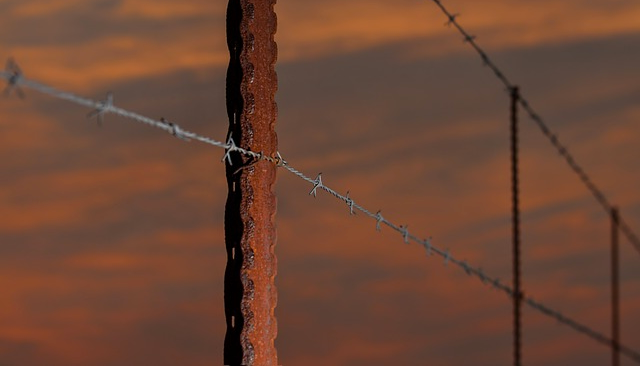
(Way With Worlds is a weekly column on the art of worldbuilding published at Seventh Sanctum, Muse Hack, and Ongoing Worlds)
Legal systems are important to our worldbuilding. I’d like to find a more flower way to say it, but really – theyre bloody important.
Think about what a legal system is:
- A reasonably organized set of rules for a defined society.
- This set of rules are backed up by formal enforcement mechanisms.
This is pretty powerful stuff. These aren’t rules that are informal. These aren’t rules that are limited. These aren’t rules where breaking them earn’s you more than a frown. These are rules backed up by serious force – and the kind of force that has at least some legitimacy and sanction.
A legal system is a kind of “limited morality” where society does the smiting when you disobey. It can’t be ignored in your worldbuilding.
It’s also very hard to worldbuild with, so I wanted to address how to – and why it’s hard.
The Challenge of Writing Legal Systems
I consider wolrdduilding leagl systems to be harder than making relgion in many cases. Religion is something that has fuzzy, human edges. Religion is something we expect to be challenging to create. Religion is visible if only because we’re too aware of the challenges it places.
But creating legal systems?
Legal systems can have both hard and soft edges, have pages of rules and general guidelines. Legal systems can be invisible because they’re more diffuse than religion, not as obvious, more structural Legal systems can lack the human face of a religion, and their mechanical nature can make it even more automatic than religion so we don’t truly see it. Finally, we often have a lot of stereotypical assumptions abut legal systems, especially in Western media, where it’s omnipresent.
They’re hard and soft at different times, hard to see and relate to, and we’re used to them.
So to build a good legal system in your worlds, there’s a few things to consider. Drop your assumptions and conside . . .
Step #1: Reasons For Laws
Law exist for reasons. They provide boundaries for behavior, appropriate responses to transgressions, and have reasons for existing. Even when we have supposedly divine laws, it seems they get rather humanly bureaucratic as the divine has to be translated into human form.
Laws are practical things, really. They always exist for reasons, if only because they’re thought of, processed, and codified by people, even when supposedly handed down from On High. When you build a world, you need to know why the laws exist and what goals were behind their creation
Of course this doesn’t mean the reasons are clear, honest, that there aren’t many of them, or that they aren’t due to insane stupidity. It doesn’t mean the reasons make sense anymore.
But the reasons are there.
(That’s your hint to not just drop a legal system you know in a world you made. If the telepaths of Amodrax V can’t stop broadcasting, you may have to have laws giving people freedom from speech after all)
Example: Fearing the wrath of the Sun God, the King creates a rule that people cannot go outside in the first hour of the day so as to not offend her. This is punished by strict fines.
Step #2: Forming Laws
Laws exist for a reason. But how to they actually become formalized into laws? How does the “reason” lead to “the form?”
Be it a god’s commandments and human interpretation, a king’s orders, or a legislature, laws have to be given form as its a bit hard to enforce them otherwise. This often involves some system of people making certain decisions, even if that decision is “write down what the King says and do it.”
As a worldbuilder you need to know how laws are given form. That may sound boring and bureuacratical (and may be) but knowing it tells you what happens when the laws enter the process of becoming “real.” Does it take forever or is it slow? Is it a reliable focus on intent or does it get bogged down in infighting among factions with a cause?
A system of randomly created laws can’t last for long (though that may be part of your world), so any sustainable system needs process to give laws form. Of course if the system is unstable, that may be part of your world, its breakdown, and your tales . . .
Example: The King’s ministers and high priest help formulate the law. “No one may be outside the first hour after dawn unless hey are doing the work of the goddess and have the dispensation of the priesthood.”
Step #3: Communicating laws
So laws get created for a reason and given form. But as noted laws are usually codified, turned into rules, and spelled out. From stone tablets with simple orders to giant legal documents from a massive legislature, Laws get processed and sent out so people can act upon them.
After all if you don’t tell people the law, they can’t follow it or they can’t be enforced. Again, that may be part of your setting, but a sustainable system needs to get the word out.
So how are laws sent to the population and the enforcers? Automatically/ Regularly? Is there training? Translation? What punishment and sanctions go with them? How are records kept?
Communication and legal systems – where fine details and punishment mix with human fallibility – will always have a mildly kafkaesque element to them due to confusion. But how much confusion is there?
A big part of your world’s legal system may be it makes no damn sense on the communication level. That makes them hard to follow and enforce. Speaking of . . .
Example: The King’s Heralds post the new laws on bills and they are entered into the great Archive Of The Law. There’s a side effect of improved clock sales.
Step #4: Enforcing
If the devil is in the details, you should start smelling brimstone right about now.
A law has to be enforced. This is when “do what we say” meets “or else,” and the “or else” part of laws can get complicated. Perusal of any week of news will reveal all sorts of complications, from near-unclassifiable threats the legal system tries to process to corruption to underfunded police.
Enforcing the law takes people, resources, social and bureaucratic systems, and finally action. Someone has to hold the trials, catch the bad guys, free the innocent, punish the guilty. Someone also has to pay for this.
Nothing says it actually is going to work very well.
This when building your world you have to ask how the enforcement mechanisms work, what pays for them, and how well they function. This is an oft-invisible part of the legal process to many of us, at least until budget cuts near us make us realize “hey this is hard.”
Remember, you may find your world’s great legal system has awful enforcement. Or your oppressive kingdom has really got one heck of a secret police. But you need to know how it works.
Example: The King’s Police realize they have to actually go outside to enforce the law, so now all police departments must receive a blessing to do so from the local Temple. In addition they now have to carry their badges openly to show they shouldn’t be penalized.
Step #5: Repercussions
Laws stop crime. Well we assume that, right? We shouldn’t.
Laws have impacts. People know about them and adjust their behavior. Enforcement of laws has repercussions. Knowing you’ll be punished for something, arresting a hundred people at once, etc. has results. It just may not be the ones that people creating the laws assumed would be had.
So in building your world you need to ask about the repercussions of laws and the legal system. Do the laws meet the intended goals? The stated goals? How are they regarded? What reactions do enforcement actions produce?
Example: The new hour-before-dawn law really screws up many businesses except people selling time pieces. The police really don’t want to offend the goddess, but think this is a bit strict. The priesthood starts discovering they can sell all sorts of blessings for the people to be outside.
Step #6: Evolution
Laws change. Cultures age, other things affect them. Law is not stagnant – even if the goal is to create surety, it is a dynamic surety as living creatures and thus their cultures are dynamic things
A law may not even make any sense after awhile. It may have been a great idea at one point, but eventually it could be useless. Those laws about horse dung on the streets don’t matter as much when we have our fyling cars.
However, as the goal of laws is to have some surety, they tend to endure. They get appended, revised, reinterpreted. If they are useless they may eventually be repealed. A culture with a good feedback system will adjust to this.
So how does the law in your world adjust – and what is the feedback system of the culture in question? Does it adapt, or does it avoid change? Do laws come and go or accumulate?
Example: The next King realizes this sun law thing is a load. Instead he adds a morning blessing at all temples so people can go outside. This quickly becomes the equivalent of an alarm clock, which affects timepiece sales. The police are glad not to enforce the law, but find they kinda like the whole “blessed badge” thing. The people begin thinking themselves superior to their neighbors as they praise the Sun God every day and they don’t. The temples miss the extra money, but a decade later a wit makes an alarm clock that has a litle priest walking around a temple tower like clockwork and they become novelty items.
Myths To Avoid
When writing about laws and legal systems, a few myths yo should be aware of.
- Fear produces obedience – Fear produces a lot of things, including psychosis, terror, and punching someone who made you afraid in the nose. Do not assume people will obey laws simply out of fear – people who are afraid do not behave as you expect. Most people think others will respond to fear the same way they do.
- “In the good old days” – This is a classic way to justify portraying law and crime in a historical or historically-based setting – well in these days such-and-such worked, and such-and-such didn’t. Don’t assume. Do your research, there are a lot of myths out there. Also, if you go for the “in this day crime was low” routine, ask yourself just what people of the time you are writing about/basing your work on considered crime – a little hint, see if women and children recieved much legal protection.
- “In this country” – Many people assume they know the laws of some other country currently or in its past. Chances are you’re pretty wrong about that. Do your research.
- “Things would be perfect if . . .” – If, when writing a story dealing with crime, you ever find yourself sounding like a politician, pause. I find that can be a sign you’re resorting to stereotypes or shallow thinking.
Legal Systems: Think And Act
Take the time to plan the legal systems of your world carefully. These powerful, at times invisible, often misunderstood social systems, can go wrong easy.
Done right of course you create a fascinating, dynamic, very “real” part of your setting and produce a better world to create in.
Respectfully,
– Steven Savage
http://www.musehack.com/
http://www.informotron.com/
http://www.seventhsanctum.com/
8 Things to Do With Zombies
Apparently I’ve been on a zombie kick as of late. I haven’t actually written any zombie stories recently, but I just finished writing a three-part series of articles on zombies for Sanitarium and there’s a zombie section to be written up soon, for a sourcebook that I’m putting together.
Here are a few ideas that I haven’t seen often, or at all. (more…)

(Way With Worlds is a weekly column on the art of worldbuilding published at Seventh Sanctum, Muse Hack, and Ongoing Worlds)
We’ve been discussing conflict as of late, from psychology to how speed (or lack of it) affects conflict. But conflicts inevitably end, if only because they become something else or because everyone involved ends up sort of dead. So what happens afterwards? What happens when conflict ends?
That’s going to happen in your world. In fact, the end of conflict may define the end of a tale you tell in your world – or be the start of one. It may involve many fine details you need to consider. Smoking aftermaths tend to be more work than actually causing them, worldbuilding-wise.
So we have to ask – what comes after.
But first, I want to address what Conflict means for worldbuilding – because it has a place. (more…)
- Magic means that everyone is armed
You may recall that there is something of a debate going on in America about gun control. Imagine that this couldn’t even be a debate. Everybody had laser eyes and a third arm with rocket-propelled knife fingers. You could, conceivably, rip those eyes out and amputate that arm, but a lot of people would complain about that and you’d have a much harder time justifying it. Especially since this wouldn’t be seen as an abnormal state of affairs. (more…)

(Way With Worlds is a weekly column on the art of worldbuilding published at Seventh Sanctum, Muse Hack, and Ongoing Worlds)
Last column I covered bias and bigotry in the settings you’re developing. Not a pleasant subject, but one that’s important because believable characters have their biases and often their bigotries – just as we do.
To summarize my handy rules-to-remember on the subject:
- Everyone has Opinions.
- When opinions “solidify” they become Biases.
- When Biases become part of our identity they become Bigotries, sort of black holes of ideals that suck other things in.
Now when bigotries seize control of an individual, a group, a nation, or a galactic confederation, that can lead to outright campaigns against various people. Attempts to extermiate, subjugate, control, or drive out an entire identifiable group. In short, persecutions.
Which is the unpleasant subject of today’s column.
Persecution is a common theme in many works, as it is (sadly) part of the human experience and human regrets. However persecution is also a word and an idea thrown around too easily, so we don’t often think about persecutions in detail when worldbuilding. It’s easy to genericize it, to stereotype it, asopposed to dealing with it as what it is – an unpleasant but near-living thing.
Let me note, again, I am discussing the behavior of humans and human-alike creatures. So other races you create may behavie differently – maybe the Dwarves of Lavabarrow* have a semi-hive mind that makes them integrate with any society or something. That’s up to you.
With that being said, let’s ask just what is persecution in a setting? (more…)
Harry Potter, Night Watch, The Dresden Files… There are more than a few worlds with a society of wizards hiding in the shadows. Throw in masquerades of any supernatural sort, not just wizards, and you have most of the urban fantasy genre. (more…)

(Way With Worlds is a weekly column on the art of worldbuilding published at Seventh Sanctum, Muse Hack, and Ongoing Worlds)
Having explored the psychology of conflict and the way that conflicts can go from simple disagreements to smashing galaxies with a Dimension Cannon, let’s take a look at some of the more personal elements of conflict. It’s a bit of a break from the galaxy-smashing thing, but the potential is there of course.
Let’s talk biases and bigotry, those steps that often let us climb the ladder to conflict. Or descend into the pit of conflict, whatever, pick your metaphor.
We’ve all encountered biases and bigotry in real life and been driven crazy by them. We know people affected by them. In our historical readings we’ve seen cases where biases and bigotry have led to atrocities with depressing regularity. Bias and bigotry is everywhere.
Which means that as world builders and creators, we need to think about these horrible things because they’re probably part of our worlds.
Worldbuilding isn’t for people afraid to get their brains messy. So since you have to write the biases and bigotries in your world, and the results of their existence, let’s talk about them.
But first . . . (more…)

(Way With Worlds is a weekly column on the art of worldbuilding published at Seventh Sanctum, Muse Hack, and Ongoing Worlds)
So there’s a reason I covered humans (and human-alikes) and the psychology of conflict first. Characters and their institutions are often the causes of conflicts – and characters are the lenses through which players/readers experience your world. We have to think about them first in the case of worldbuilding because it gives us the right perspective.
But with that said, you need something to get your cast to engage in (or prevent) atrocities. What are he drivers and elements that create wars and conflicts?
Again, it’s often a matter of perspective. Which is the problem in fiction – and come to think of it real life as well . . . (more…)

(Way With Worlds is a weekly column on the art of worldbuilding published at Seventh Sanctum, Muse Hack, and Ongoing Worlds)
For the next few columns I’m going to be exploring the dysfunctions and conflicts in the worlds we create. Not conflicts brought about by our mistakes as worldbuilders (though those can become fuel for deeper worldbuilding as noted), but what happens when things break down? Sure we’re all busy building our world, but things go wrong inside the worlds as part of good worldbuilding, and we have to figure out the implications of the crises we create.
In fact, as repeated several times, conflict is actually part of the process of making a world accessible and interesting. People want to hear stories and play games about things that happen, and that often involves conflict. Not always of course, but often enough it warrants its own section here in a series of columns by a slightly-mad-scientist of randomizing ideas.
Now everyday conflicts are one thing; arguing over a tab, not being able to find dragon dung at the alchemist’s shop, and so on. Let’s talk about the big ones, the ones that are epic and horrible, the ones we write about – and the ones that in real life make us wonder why the hell they happened.
So let’s go and find out just how things break down and go wrong. We’ll start with how it stays together in the first place – well, how our cast of characters and people keep it together. After all, they’ll be the ones you’re writing about or your players are playing.
Also they’re probably the ones causing the problems . . . (more…)

(Way With Worlds is a weekly column on the art of worldbuilding published at Seventh Sanctum, Muse Hack, and Ongoing Worlds)
So last we met I discussed how using RPGs was actually a boon to Worldbuilding. There were positives in stimulating thinking, in sheer entertainment, and of course using premade concepts to test the consistency of an RPG system.
Now let’s talk the negatives of using using RPG systems in your worldbuilding, be they mapping characters to classes or diving into them for ideas. Yes, there are negatives.
Hey, it’s not all sunshine and worldbuilding here. Some stuff is just bad.
The core issue is that RPG systems are just that – systems – and any use of a system can constrain you. That is actually the point of having a system. The problem is the system is an outside factor influencing your imagination.
Which is good. Sometimes.
In this case however, we’ll look at how it can go bad. (more…)




